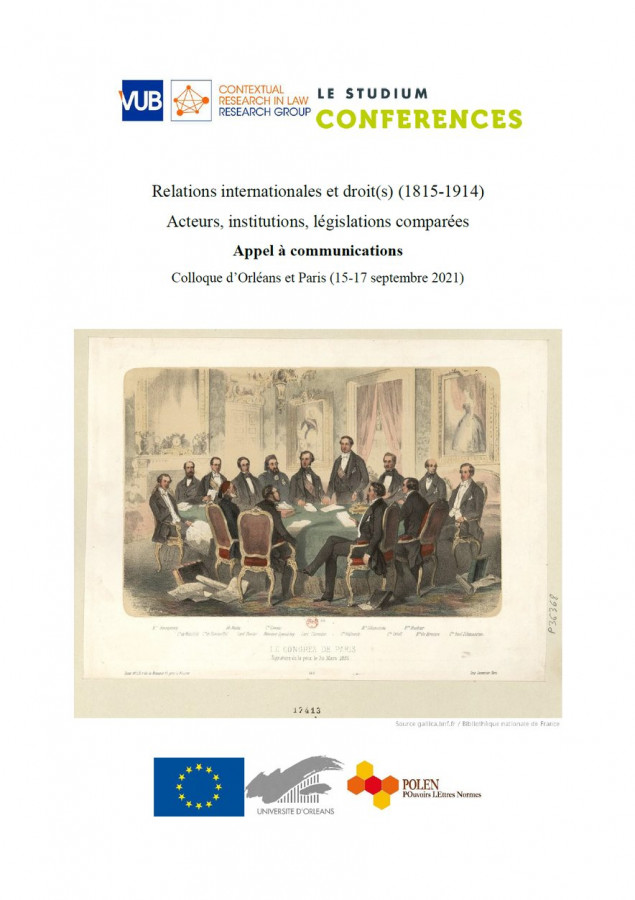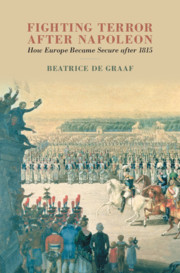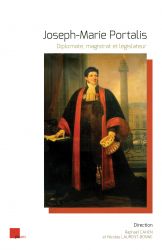In the last twenty years, the study of the history of
international law and of international relations has witnessed something of a
renaissance. Historians have adopted novel approaches to investigate diplomatic
relations, the international system, and the discipline of international law.
Fruitful perspectives from cultural, social, global and transnational histories
as well as from gender studies, Third World approaches to international law,
and postcolonial and imperial histories have all shed new light on the
evolution of international law in the nineteenth century. The bicentenary of
the Congress of Vienna (1814-1815) also led to several new publications on the
Congress System and on the “security culture” that was established in the
aftermath of Napoleon. Nevertheless, many lacunae remain, especially regarding
the relationship between law(s) and international relations during the long
nineteenth century and in the sociocultural history of international law as a
discipline with its own actors, networks, venues, institutions and power
circles. The years 1815-1869 have been relatively neglected in the
historiography, doubtless because they have generally been seen as a time when
world governance rested more on political relationships than on juridical rules.
Historian David Kennedy has thus written provocatively: “For international law,
as for much of the rest of twentieth-century legal thought, it is really only
the last five minutes of the nineteenth century that count.” And indeed, it is
true that many recent and inspiring research works pay scant attention to the
first half of the nineteenth century, such as the volumes of Juristes et
relations internationales (Relations Internationales 2012/1)
and Profession, juristes
internationalistes ? (Monde(s) 2015/1).
International law was first institutionalized in 1873
with the foundation in Belgium of the Institut de Droit International
and the Association pour la réforme et la codification du droit des gens
(known from 1895 onwards as the International
Law Association). But the basic
premises of this development occurred much earlier with the publication of
several textbooks on both private and public international law in the 1830s and
1840s. Moreover, legal advisers were already employed in the foreign offices of
many European nation-states and empires (as well as their colonies) in the
United States, South America and Asia. International law was also spread
through various scientific academies across the world, some of which organized
contests on international law, such as the competitions organized by the
Académie des sciences morales et politiques in France for 1839-1840, 1856-1857,
1892, and 1908. Many scientific journals also contained articles on
international law in this earlier period, including the Thémis ou
bibliothèque des jurisconsultes
(1820-1830), the Kritische Zeitschrift für Rechtswissenschaft und
Gesetzgebung des Auslands (1829-1856), the Revue de législation et de
jurisprudence (1834-1853), the various journals edited by Jean-Jacques
Gaspard Foelix (1834-1850), the Archives de droit et de législation
(1837-1841), the Belgique judiciaire (1843-1914) and the Revue
historique de droit français et étranger (1855-2021).
The
aim of the present conference is to deepen our study of the
interconnections between law(s) and international relations through the eyes of
a plurality of actors (e.g., legal advisers, lawyers, judges, activists,
publicists, journalists, editors), institutions (e.g., foreign offices,
courts, universities, academies of science, associations, libraries) and works
on comparative law.
Three
focuses will be especially addressed by this conference. The first is the
plurality of actors. We welcome proposals on legal advisers within governments,
foreign offices and national or colonial administrations; on civil and
administrative judges, admiralty courts and prize laws; and on lawyers, academics, peace activists,
international thinkers, journalists and editors, including women as well as
men. A prosopography of a group of actors is invited as well as individual
biographies. The theme of the birth and professionalization of “international
lawyers” will be studied as well as the various editors and the book market for
international law.
Our
second focus will be on institutions. We especially invite papers studying the
treatment of law(s) in foreign offices in a comparative perspective. For
example, in Great Britain, legal issues were dealt by the Queens Lawyers until
1872 and afterwards by the Legal Adviser of the Foreign Office. In France after
1835, it was the Comité consultatif du contentieux that dealt with legal
issues. But what about the foreign offices of other countries? Other
institutions (similar to the Conseil d’état in France) may have also had their
own “Foreign Office Committee.” How were these organized? Did they cooperate
with the foreign office? What role was
played by scientific academies in the diffusion of international law? By the
universities? By popular libraries?
Our
third and final focus is on the study of comparative law and its link to the
development of international law. The Société de législation comparée, founded
in 1869, was full of members of the first generation of the Institut de
Droit International, while many comparativists were, vice versa,
members of the Institut de Droit International. Scientific journals such as the Revue
historique de droit français et étranger and the Revue de droit
international et de législation comparée dealt with both comparative and
international law. Papers on the progressive autonomy of the discipline
and on the networks of the founding members are especially welcome.
Proposals
in French, English or Spanish may be sent by email to raphael.cahen@vub.be, to pierre.allorant@univ-orleans.fr or to walter.badier@univ-orleans.fr. All applications must be sent by
31 March 2021 with a proposal of at least 3,000 characters. The proceedings
will appear in a peer-reviewed publication. Transportation and accommodation
costs will be covered by organizing institutions.
Short List of
Literature
-Allorant
Pierre and Walter Badier,
« La Société de législation comparée : boîte à idées du
parlementarisme libéral de l’Empire libéral à la République
opportuniste », Clio@Themis, vol. 13, 2017.
-Alexandrowicz
Charles Henry, David Armitage,
Jennifer Pitts (ed.), The Law of Nations in Global History,
Oxford, Oxford University Press, 2017.
-Arcidiacono
Bruno, Cinq types de paix : une histoire
des plans de pacification perpétuelle, XVIIe-XXe siècles, Paris, PUF, 2011.
-Armitage
David, Foundations of modern
international thought, New York, Cambridge University Press, 2013.
-Audren
Frédéric, Jean-Louis Halpérin, La culture juridique française. Entre mythes
et réalités. XIXe-XXe siècles, Paris, CNRS éditions, 2013.
-Badel Laurence
(ed.), Histoire et relations internationales, Paris, Presses de la
Sorbonne, 2020.
-Baillou
Jean (ed.), Les affaires étrangères et le
corps diplomatique français, Paris, CNRS éditions, 1984.
-Becker Lorca Arnulf, Mestizo International
Law: A Global Intellectual History, 1842-1933, Cambridge, CUP, 2015.
-Benton
Laura and Lisa Ford, Rage for
Order. The British Empire and the Origins of International Law, Cambridge,
HUP, 2016.
-Bois
Jean-Pierre, La paix : histoire politique et militaire, 1435-1878,
Paris, Perrin, 2012.
-Bruley
Yves, Le quai d’Orsay impérial. Histoire du ministère des Affaires
étrangères sous le Second Empire, Paris, A. Pedone, 2012.
-« Le Concert européen à l’époque du Second Empire », Relations internationales, 90, 1997, p. 145-163.
-Cahen
Raphaël, « The Mahmoud ben Ayad case and the Transformation of International
Law », International Law in the Long
Nineteenth Century (1776-1914). From the Public Law of Europe to Global International
Law?, Inge Van Hulle, Randall Lesaffer (ed.), Leiden, Brill, 2019, p. 126-139.
-« Hauterive
et l’école des diplomates (1800-1830) », Clio@Themis, vol. 18, 2020.
-Cahen Raphaël, Frederik Dhondt, Elisabetta Fiocchi-Malaspina, « l’essor récent de
l’histoire du droit international », Clio@themis, 18, 2020.
-Dhondt
Frederik, « Recent research in the history of international law », Revue d’histoire du droit, 84, 2016, p.
313-334.
-« Portalis
le jeune et le droit des gens », Joseph-Marie
Portalis (1778-1858) : diplomate, magistrat et législateur, R. Cahen, N. Laurent-Bonne (ed.), Aix-en-Provence, PUAM, 2020, p. 153-182.
-Drocourt
Nicolas, Eric Schnakenbourg (ed.),
Thémis en diplomatie. Droits et arguments
juridiques dans les relations internationales, Rennes, PUR, 2016.
-Fassbender Bardo and Anne Peters (ed.), The Oxford Handbook of the History of International Law, Oxford,
OUP, 2012.
-Fiocchi Malaspina Elisabetta, L'eterno ritorno del Droit
des gens di Emer de Vattel (secc. XVIII-XIX): L'impatto sulla cultura giuridica
in prospettiva globale, Frankfurt, MPI for European Legal History, 2017.
-Gaurier
Dominique, Histoire du droit
international. De l’Antiquité à la
création de l’ONU, Rennes, PUR, 2014.
-Genin
Vincent, Le laboratoire belge du droit
international : une communauté épistémique et internationale de juristes
(1869-1914), Bruxelles, Académie royale de Belgique, 2018.
-Ghervas
Stella, Conquering Peace : From the Enlightenment to the European Union,
Cambridge, HUP, 2021.
-Graaf
Beatrice De, Ido de Haan, Brian Vick (ed.), Securing Europe after Napoleon: 1815 and the New European Security
Culture, Cambridge, CUP, 2019.
-Graaf Beatrice
de, Fighting Terror after Napoleon. How Europe Became Secure after 1815,
Cambridge, CUP, 2020.
-Hellmann Gunther, Andreas Fahrmeir, Milos Vec (ed.), The transformation of Foreign Policy, Drawing
and Managing Boundaries from Antiquity to the Present, Oxford, OUP,
2016.
-Jarrett Mark, The Congress of Vienna and its Legacy War
and Great Power Diplomacy after Napoleon, London, Tauris, 2014.
-Jones Kate, « Marking Foreign Policy by Justice: the Legal Advisers to the
Foreign Office, 1876-1953 », in Robert McCorquodale,
Jean-Pierre Gauci (ed.) British
Influences on International Law, 1915-2015, Leiden, Brill, 2016, p. 28-55.
-Keller-Kemmerer Nina, Die Mimikry des Völkerrechts Andrés
Bellos 'Principios de Derecho Internacional', Baden-Baden, Nomos Verlag,
2018.
- Kennedy David, « International Law
and the Nineteenth Century: History of an Illusion », Nordic Journal of
International Law, vol. 65/3-4, 1996, p.385-420.
-Kévonian Dzovinar, Jean-Michel Guieu (ed.), « Juristes et
relations internationales », Relations internationales, 149/1,
2012.
-Kévonian, Dzovinar and Philippe Rygiel (ed.), « Profession,
juristes internationalistes? », Monde(s), vol. 7/1, 2015.
-Kévonian, Dzovinar and Philippe Rygiel (ed.), « Histories of
International Lawyers between Trajectories, Practices, and Discourses », Jus
Gentium, vol. 5/2, 2020.
-Koskenniemi
Martti, The Gentle Civilizer of Nation :
the Rise and Fall of International Law 1870-1960, Cambridge, Cambridge
University Press, 2002.
-« Why history of international law
today? », Rechtsgeschichte, 4,
2004, p. 61-66.
-« What should international legal history
become? », in System, Order and International Law. The Early History of
International Legal Thought from Machiavelli to Hegel, Stefan Kadelbach et al. (ed.), Oxford, OUP,
2017, p. 381-397.
-Koskenniemi Martti, Walter Rech, Manuel Jimenez Fonseca (ed), International Law and Empire. Historical
Explorations, Oxford, OUP, 2017.
-Nuzzo Luiggi and Miloš Vec (ed.), Constructing International Law. The Birth of a Discipline, Francfort/M. 2012.
-Nuzzo
Luiggi, Origini di una scienza : diritto internazionale e colonialismo nel XIX secolo,
Francfort, MPI, 2012.
-Obregon Liliana, « Peripheral
Histories of International Law », Annual Review of Law and Social
Science, 15, 2019, p. 437-451.
-Owens
Patricia and Katharina Rietzler
(ed.), Women’s International Thought: A New History, Cambridge,
CUB, 2021
-Rasilla
Ignacio de la, “A Very Short History of International Law Journals
(1869–2018)”, EJIL, 29/1, 2018, 137–168.
-Rygiel Philippe, « De savants juristes au service de la
France. Les experts du droit international auprès du Quai d’Orsay,
1874-1918 », Experts et expertise en
diplomatie. La mobilisation des compétences dans les relations internationales
du congrès de Westphalie à la naissance de l’ONU, Stanislas Jeannesson, Éric Schnakenbourg, Fabrice Jesné
(ed.), Rennes, PUR, 2018, p. 205-222.
-Sédouy
Jacques-Alain de, Le Concert européen.
Aux origines de l’Europe, Paris, Fayard, 2009.
-Schroeder Paul, The
Transformation of European Politics, 1763-1848, Oxford, Clarendon Press,
1994.
-Sluga
Glenda and Carolyn James (ed.), Women,
diplomacy and international politics since 1500, London, Routledge, 2016.
-Soutou
Georges-Henri, L’Europe de 1815 à nos
jours, Paris, PUF, coll. « Nouvelle Clio »,
2007.
-Vick Brian,
The Congress of Vienna - Power and Politics after
Napoleon, Cambridge, HUP, 2014.
Organising Committee
Pierre
Allorant (Université d’Orléans)
Walter Badier (Université d’Orléans)
Raphaël Cahen (Le Studium Orléans/Vrije Universiteit Brussel).
Scientific Committee
Pierre Allorant (Université d’Orléans)
Éric Anceau (Sorbonne Université)
Yves Bruley (Ecole
Pratique des Hautes Etudes)
Noëlline Castagnez (Université
d’Orléans)
Nicolas Cornu Thénard (Paris II)
Frederik Dhondt (Vrije Universiteit Brussel)
Jean Garrigues (Université d’Orléans)
Stella Ghervas (Newcastle University)
Martti
Koskenniemi (University of Helsinki)
Milos Vec
(University of Vienna)
(source: univ-droit)














